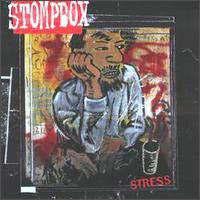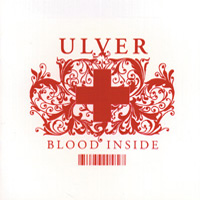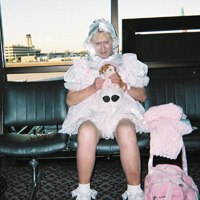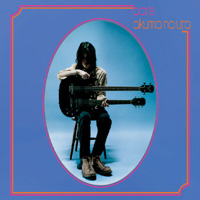 Boris
Boris
Mabura No Ura (Southern Lord)
by Chad Van Wagner
An interview with bassist/guitarist Takeshi
Questions translated by Enju Tanahashi.
Answers translated by Ai Miyata.
For the last few years – basically since 1998’s Amplifier Worship hit the West with a resounding WHUMP – Japan’s Boris is a name that has been spoken with reverential tones amongst those who embrace The Heavy. But far from being simple practitioners of bong-hit thudcore, there’s an experimental streak in boris (or BORIS: More on that below) that has added a layer of mystique which has only been magnified by their infrequent (bordering on nonexistent) Western shows.
Having taken their name from the lead-in track of the Melvins’ mighty Bullhead LP, there are some comparisons with that band which must be gotten out of the way. Yes, they’re heavier than God. Yes, their releases run the gamut from straight-up crotch-grabbing rock to impenetrable static. Yes, their blatant disregard for conforming to people’s expectations can occasionally be maddening.
Extending that parallel any further, however, does a grave disservice to the sheer breadth and creative chutzpah the band has consistently displayed. Where Seattle’s finest have court jester tendencies that can occasionally derail their aesthetic momentum, Boris have no time to dick around. There is no irony in Boris’ attack (none that this lumpy white guy can discern, anyway) which allows the music to possess a transcendental earnestness that carries into even their most inaccessible material. It’s inevitable that some albums are better than others, but, unlike even many of the strongest catalogs in the rock canon, there is no Boris album which can be categorized as “the crappy one.” “The difficult one,” maybe, but if you don’t have room for difficult music in your life, it’s inadvisable to venture beyond classic rock anyway, so the point is moot.
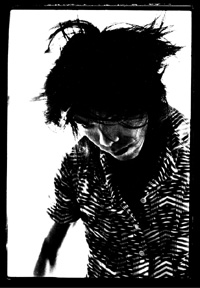 How did the band first meet?
How did the band first meet?
We went to the same Art College, where we met through mutual friends. We had a different drummer: There used to be four of us, and Atsuo was the singer. At first, we just wanted to see how we sounded, and we wrote our first song and played live. Then, in 1995, Atsuo moved to the drums, and our current lineup took shape. There are three of us now.
There are two sides to what you do. When you release something like “Dronevil,” do you worry about confusing some of your audience, who might not understand the more experimental work?
We’re not afraid to try anything, because we have some fans who like the experimental side, and some who like the heavy rock, and some who like both. When we use the name boris, we’re experimental, but when we use BORIS, we’re heavy. This is how we let people know what we’re doing. If someone likes the experimental stuff, maybe they’ll listen to the heavier stuff with a more open mind, and vice versa. It’s all rock. Some people get confused by the different styles, but we’re OK with that. We want to challenge people. If we challenge them, we’re having an impact.
You have a big Melvins influence. What other artists influence your work?
It’s true that we’re influenced by the Melvins, but we all have different backgrounds. It’s hard to say we like one kind of art. We’re influenced by music, videos, literary works, etc. Anything that shows creativity and emotion can be an influence. I like YMO, and Wata likes Guitar Wolf (although she prefers cosmetics), and Atsuo likes anime.
How do you see yourself? As a rock band, a stoner band, or a progressive/experimental band?
It’s easy to categorize something. We ourselves think we’re a rock band, and that’s enough. When we release a new album, the record store clerk decides which section we go in, which can get interesting! We like the confusion. Sometimes, the classification can help people understand the music.
Do you think of Boris as a band for the head or the heart?
We want people to experience us with all five senses. The sixth sense would be OK, too.
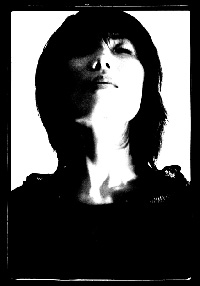 How did you get together with Keiji Haino? How about Merzbow?
How did you get together with Keiji Haino? How about Merzbow?
Both of them like rock, that’s all. Mr. Haino invited us. We played some shows with Mr. Akita, so we asked him to record an album together.
Who do you admire in the music scene right now?
People who are sincere, honest with themselves, show their feelings purely. People who want to grow with what they do. People have a tendency to admire only players, but the people who support them and introduce their music to listeners are also important.
People in the underground sometimes think there’s just the indie bands and the listeners, but there are a lot of people you work with that can influence you. You can be part of an underground scene, but you have to change inside, or it doesn’t mean anything.
Why is Wata bleeding from the head on the cover of Feedbacker? Is she bleeding from the ears because of the volume, or is it something more sinister?
The title was Boris at Last. Wata had become an icon for Boris, so if she died, would it be the end of Boris? But I wouldn’t read too much into it, because sometimes death can signal a new beginning.
Do you have a favorite Boris album?
Takeshi: Amplifier Worship/Flood/Feedbacker.
Atsuo: The next one. I always get bored with our albums while we’re mastering them.
Wata: Feedbacker
 How did you connect with Steven O’Malley?
How did you connect with Steven O’Malley?
We met Stephen O’Malley in 1996, when we were on tour, in Seattle. At that time, he was starting up Southern Lord. We’ve kept in touch ever since. He’s a good friend, he understands us. We kept in touch through faxes and letters, since the Internet wasn’t as big as it is now.
Is there anyone you would like to work with that you haven’t yet?
You can work with people whenever you want, but it doesn’t mean it will be good! You need chemistry. You never know when you’ll meet someone, when the time is right. Right now we’re working with Sunn 0))).
How important is it for you to be heard outside Japan?
All our lyrics are in Japanese, but when people from other countries hear them, they understand the music. If you listen to the music, and you understand Japanese culture, those can work together, and you can imagine what it’s about. When people understand what we do, it makes us feel we’re part of the world, that we’re part of rock’s history.
Do you see Boris as having anything in common with musical trends like progressive or German “Krautrock,” in addition to the stoner/sludge movement?
We love prog and Krautrock! We love psychedelic music, the kind that enters your mind, and takes you on a trip to anywhere. Its influence naturally finds its way into our music, but we’re trying to do something different, something beyond. We don’t want to be a throwback. There’s nothing to be gained from playing it safe, you have to grow. We don’t think too much about originality, or our image, but we want something to connect us to now.
(www.southernlord.com)

